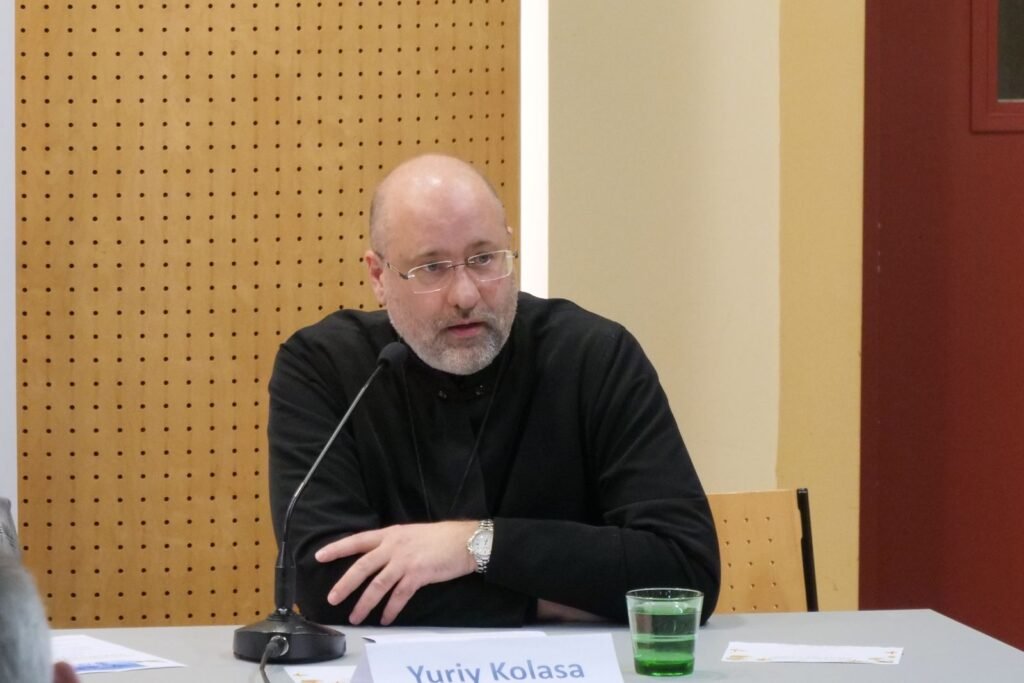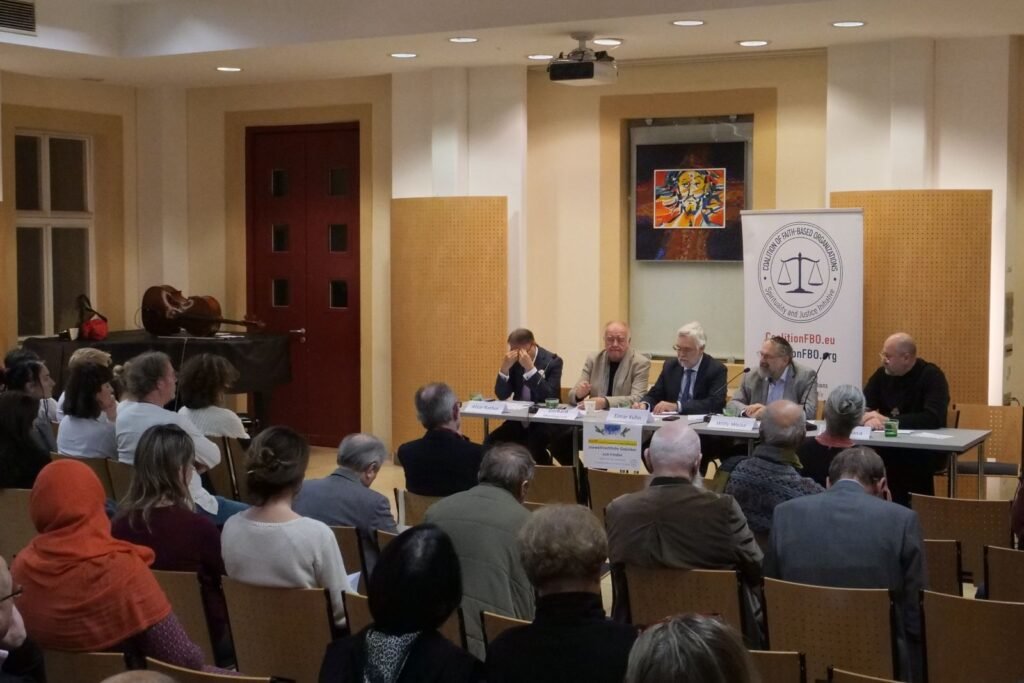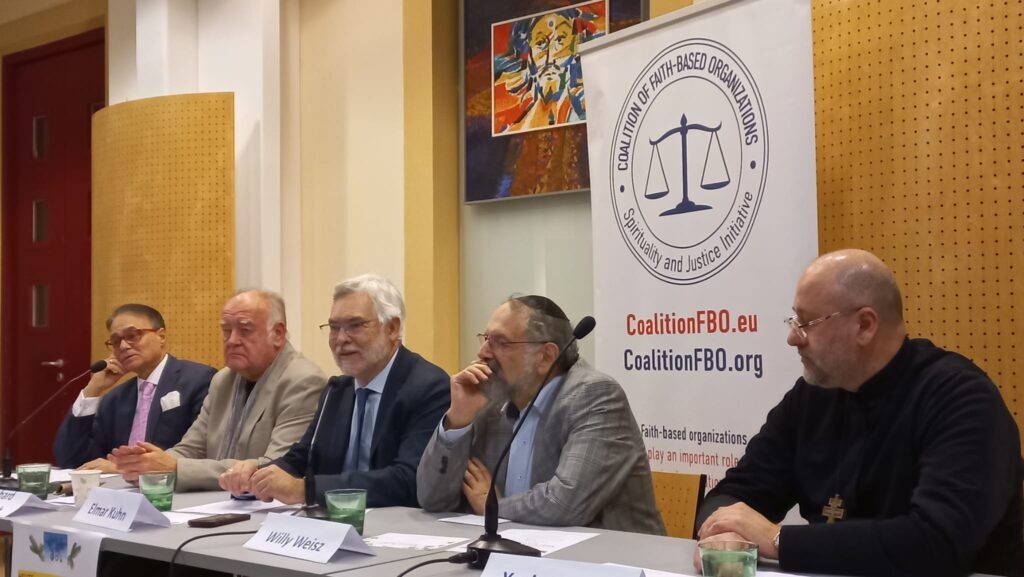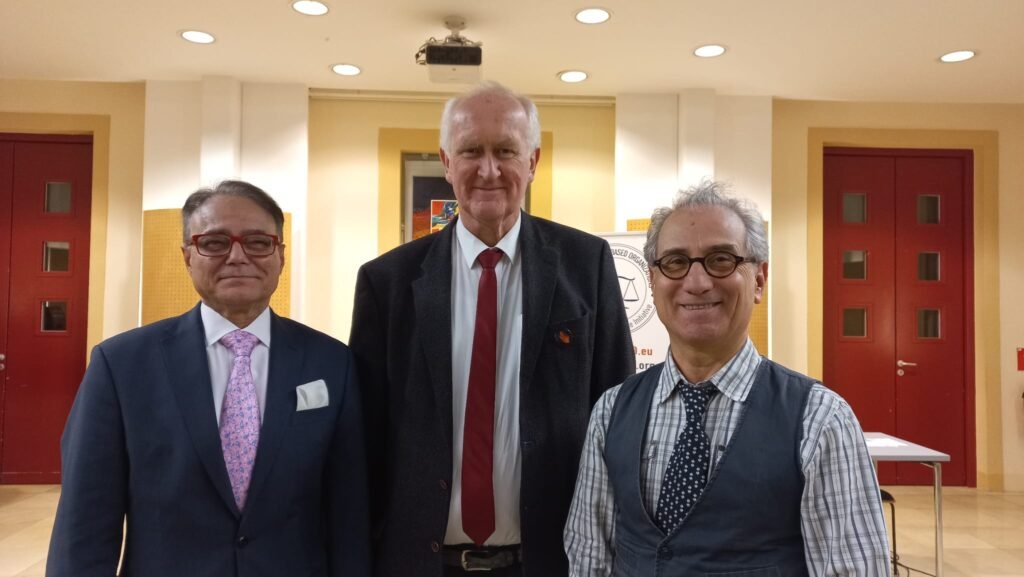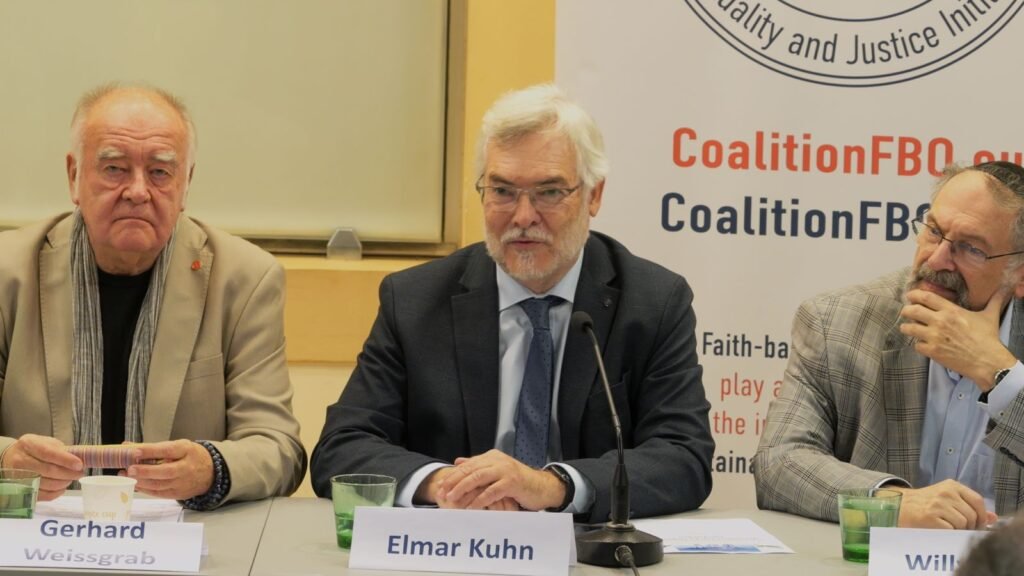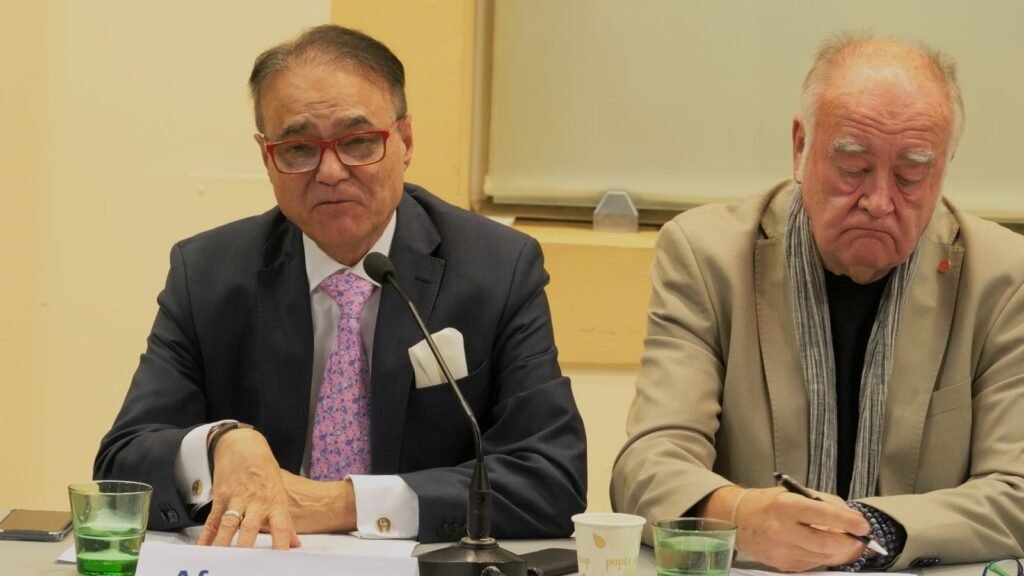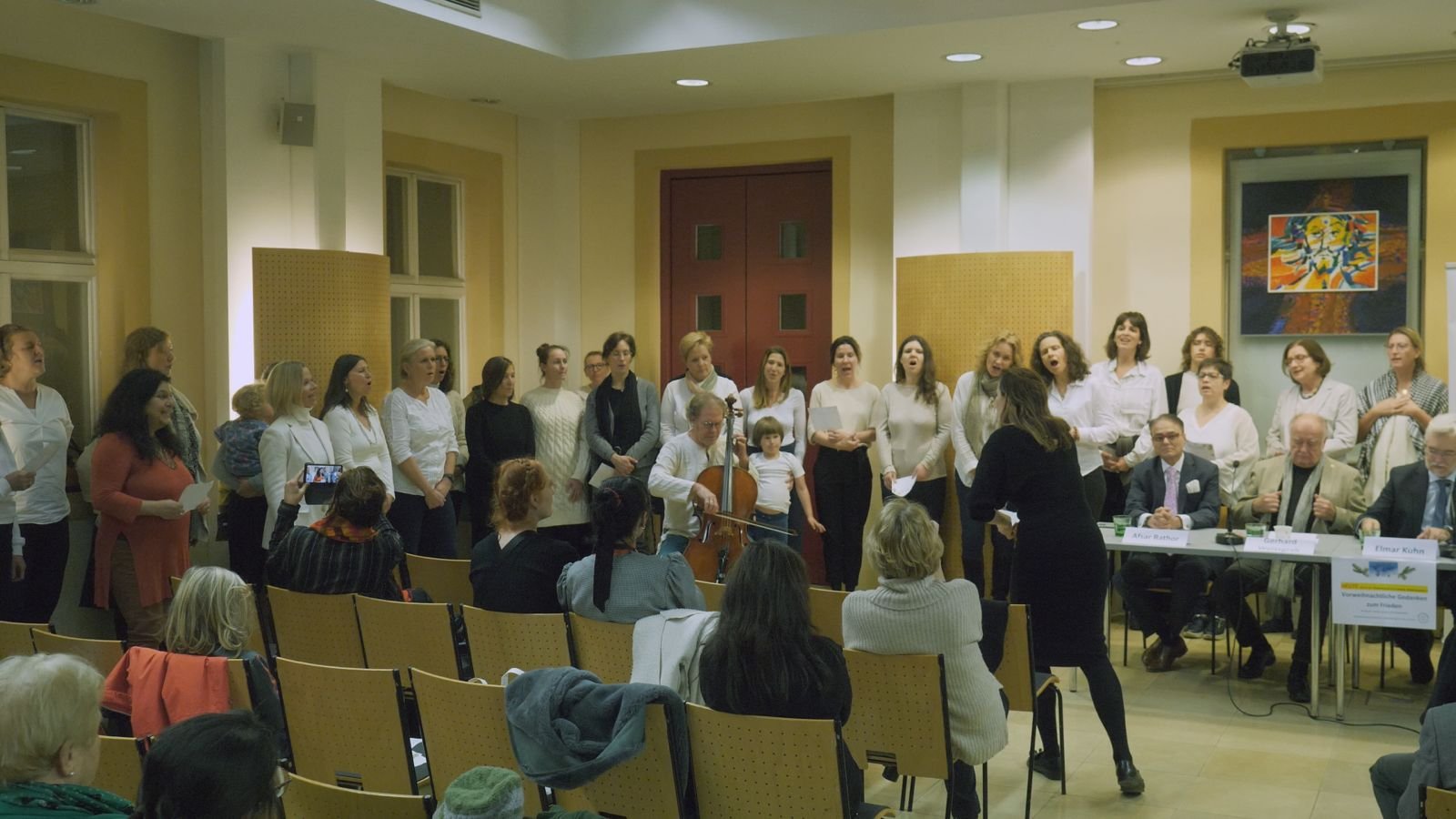by Muhammad Amir Siddique / Jakob Staubmann
In a world plagued by the constant threat of war and terror, the Coalition of Faith-Based Organizations (CFBO) has taken a stand for peace. On December 20th, 2023, the CFBO organized a discussion evening in Vienna, specifically at Stephanisaal, Stephansplatz 3. The event aimed to showcase the religions’ collective desire for peace, as representatives from Buddhism, Judaism, Christianity, and Islam gathered to promote a culture of dialogue.
The program, attended by a diverse audience, featured the newly founded choir of soprano Ira Lauren, known as the “Peace Prayer Mandala.” This interfaith choir sang Christmas and peace songs, adding a harmonious touch to the evening. The event was moderated by Elmar Kuhn, who expressed gratitude to all participants.
Distinguished guests, including Yuriy Kolasa, Vicar General for the Eastern Catholic Churches in Austria, Afsar Rathor, President of lios-soil.org and Project Manager at UNIDO, Gerhard Weissgrab, President of the Buddhist Religious Society of Austria, and Willy Weisz, Vice President of the Coordination Committee for Christian-Jewish Cooperation at IKG Vienna, delivered speeches emphasizing the importance of peace and dialogue.
The Peace Prayer Mandala, discovered in a singing therapy songbook, became the focal point of the event. Soprano Ira Lauren, along with many singers from various backgrounds, joined forces to make a powerful statement for peace during these times of crisis and unrest. The support of Peter Haider, a member of the CFBO, led to the invitation to sing at an interfaith Christmas party, which brought together a diverse group of participants, including yoga practitioners, former classmates, and music enthusiasts.
The rehearsals for the Peace Prayer Mandala were held at the Eloquent language institute, generously provided by Angelika Luitz. The musical accompaniment was expertly provided by cellist Mark Culbard Peters, a visitor to Ira Lauren’s yoga classes. Lastly, opera singer Vanja stepped in as the conductor, ensuring a memorable performance.
As the evening came to a close, the participants expressed their hope for a peaceful future and looked forward to future peace projects. In the spirit of the season, they wished everyone a merry, peaceful, and blessed Christmas.
The Role of Religions in Achieving Lasting Peace
Mr Afsar Rathor, a Pakistani Muslim with 27 years of experience serving the UN, recently highlighted the failures of the organization in preventing wars and conflicts. In his view, the UN has repeatedly fallen short in its mission to maintain peace. Drawing from his extensive experience in peacekeeping missions, Rathor emphasized the importance of religions and religious leaders in ensuring lasting peace.
According to Rathor, when the UN fails, dialogue between religious leaders becomes crucial. He believes that religion can serve as a powerful weapon in achieving peace. Despite being labeled as naive, Rathor’s faith in the potential of religions to mediate peace has yielded positive results. He cited examples such as the reconciliation efforts in Rwanda and his recent involvement in brokering a religious-based ceasefire in Yemen.
Rathor’s experiences in Moscow and Kiev further reinforced his belief in the role of religions in peacebuilding. He observed that the younger generation, in particular, supports peace initiatives and recognizes that war does not lead to lasting peace.
Yuri Kolosa, a Ukrainian Catholic priest, echoes Rathor’s sentiments. As the vicar general for the Eastern Catholic Churches in Austria, Kolosa questions the absence of peace on earth, especially in the context of the ongoing war in Ukraine. He believes that churches have the power to transform hate into love, serving as a catalyst for reconciliation.
Kolosa points to the churches in Ukraine as examples where forgiveness and love prevail amidst terror and war. These religious institutions provide a platform for people to heal and rebuild, fostering an environment conducive to peace.
While the UN may have its limitations, Rathor and Kolosa’s experiences highlight the potential of religions and religious leaders in bringing about lasting peace. Their efforts serve as a reminder that peace on earth can be achieved through dialogue, forgiveness, and love.
Where is Peace on Earth?
In the midst of the ongoing war in Ukraine, with a staggering number of casualties, the question of where peace on earth can be found weighs heavily on the hearts of many. Yuri Kolosa, a Ukrainian Catholic priest, believes that the answer lies within the churches. He asserts that it is through the transformative power of love and forgiveness that reconciliation can be achieved. Kolosa’s perspective is echoed by Willy Weisz from the Jewish Community of Vienna, who emphasizes the interdependence of justice and peace. He highlights the importance of freedom in fostering a peaceful society, drawing attention to the recent Hanukkah Festival of Lights as a symbol of this ideal. In the Jewish liturgy, the greeting of “Shalom” embodies the pursuit of inner peace as well. Gerhard Weissgrab, the President of the Buddhist Religious Society in Austria, adds a Buddhist perspective to the discussion. He emphasizes the need to move away from hatred and delusion, and advocates for dialogue not only within religious contexts but also across all areas of society. Weissgrab believes that inner serenity is a prerequisite for peace, but acknowledges that patience is crucial in this process. The event held at St. Stephen’s Hall, despite the busy Advent season, brought together nearly 100 individuals who recognized the absence of quick solutions. It was clear that those in power often prioritize their own agendas over the pursuit of peace. However, platforms like the Coalition offer hope and a space for dialogue. Elmar Kuhn, the moderator of the event and general secretary of Christians in Need, emphasizes the importance of grassroots efforts and dialogue with different religions. He believes that peace and tolerance can only emerge through understanding and respect for one another, not through violence imposed from above. The participants left the event with renewed hope and a sense of responsibility as ambassadors of peace. The “Peace Prayer Mandala” that everyone sang along became a powerful demonstration of their collective desire for peace in a world torn by conflict.
